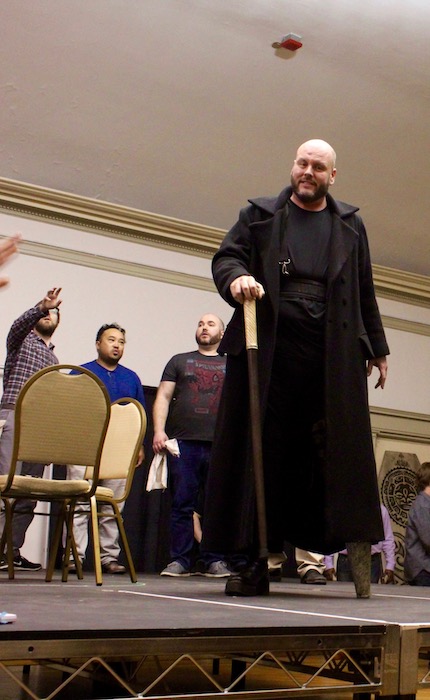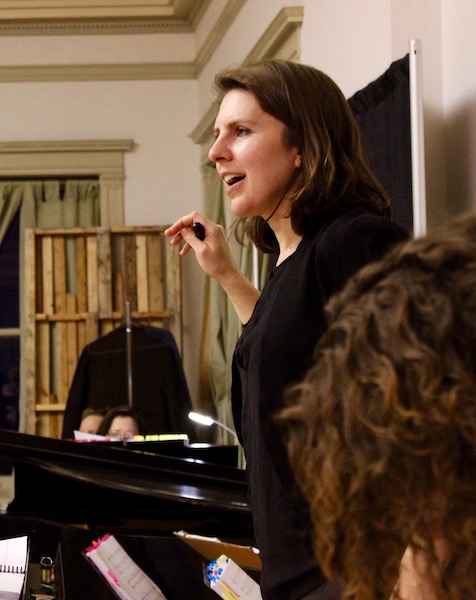Human drama to the fore in COT’s Chicago premiere of “Moby-Dick”

More than 150 years after Moby-Dick was published, successful adaptations of Herman Melville’s epic are still something of a white whale themselves. Playwrights, filmmakers, and more have tried their hand interpreting the behemothic American novel for generations, invariably with mixed and unwieldy results.
Not so for composer Jake Heggie and librettist Gene Scheer, whose Moby-Dick took the world’s opera stages by storm after its fêted 2010 premiere at Dallas Opera. Since then, the work has been presented by 11 different companies around the world, reaching even more audiences when San Francisco Opera’s 2012 performance was filmed and broadcast as part of PBS’s Great Performances series. Some critics have heralded it as not just one of the great American operas of the last half-century, but one of the greatest American operas, period.
Another testament to Moby-Dick’s widespread appeal? When Chicago Opera Theater (COT) gives the work’s Midwest premiere at Harris Theater on Thursday, Chicago audiences will be seeing the second production of this not-yet-decade-old opera — a work that is also notoriously difficult to stage.
“It’s a massive undertaking, this piece,” Heggie said in a phone interview from his home in San Francisco. “It’s a big chorus, a big cast, a big orchestra, and a big story.”
Mounted in major houses from 2010 to 2016, the inaugural Moby-Dick production offered an aptly larger-than-life presentation for this larger-than-life novel. The original Dallas Opera staging, with its spectacular projections, was so widely hailed that the opera became synonymous with that celebrated, well-traveled design.
However, COT’s Moby-Dick opts for a more scaled-down approach. Stage director Kristine McIntyre and set director Erhard Rom designed this new production with regional companies in mind. (This staging has already been presented by the Utah, Pittsburgh, and San Jose opera companies and, after COT, will move on to Barcelona’s Gran Teatre del Liceu.)
Heggie believes that this more modular version emphasizes the tale’s human element over spectacle.
“The original production was so massive, but this one is very compact,” says Heggie. “No projections, none of the theater-magic bells and whistles. The focus is really on the characters in a way that makes the whole thing feel very Shakespearean,” he said.
That’s not to say that COT’s production isn’t titanic in its own right. Clocking in at two and a half hours, with eight character roles and an all-male chorus, Heggie’s opus is still grand opera no matter how you slice it.
And audiences can nonetheless expect plenty of bells and whistles in this production, from small boats that fly around the stage to a towering ship mast, supported by a hydraulic lift specifically designed for the production.
At an early rehearsal in the Fine Arts Building, a jocular, even boisterous atmosphere was manifest. COT music director Lidiya Yankovskaya conducted the piano rehearsal with efficiency, taking occasional pauses to address balance and staging issues. The assembled principals and nearly forty-men chorus were working through the first scene of Act II, an energetic deck-swabbing number teeming with onstage antics. In addition to blocking out the movements, director McIntyre was dancing along with the cast, mop in hand.
“Remember, work is much easier when you’re singing along!” McIntyre called out above the din.
This Chicago debut of Moby-Dick is long overdue, given Heggie’s reputation as one of the most successful of contemporary opera composers.
Heggie’s Dead Man Walking (2000), which has been seen at most of the world’s leading opera houses will finally be presented at Lyric Opera in the 2019-20 season. (Northwestern University Opera Theater mounted a highly acclaimed production in 2015.) The last professional staging of one of Heggie’s operas was Three Decembers back in 2010, also under COT’s auspices.

According to music director Yankovskaya, Moby-Dick perfectly aligns with the company’s programming values and its advocacy for canonic but works that are rarely heard locally — and offers the chance for Chicago audiences to hear from a composer she calls “the defining force of American opera.”
“He stands up there with all the great composers,” Yankovskaya says. “I think it’s important for Chicago audiences to have exposure to a work that has become one of the great works of the operatic repertoire.”
COT’s Captain Ahab is similarly generous with his praise for Moby-Dick. While singing the role at Opera San Jose in February, tenor Richard Cox got the call to sub for the originally announced Tom Studebaker in the production’s Chicago run. Cox immediately jumped at the opportunity.
“I do believe that Moby-Dick is on the same level as an Otello, or a Falstaff,” Cox says. “I’ve rarely been such a fan of a piece that I’ve been a part of. What Heggie and Scheer have accomplished hopefully gives way to more great American literature being translated to the operatic stage.”
No doubt, part of Heggie and Scheer’s success is that their Moby-Dick doesn’t attempt to literally translate the 1851 novel to the stage. The libretto is only about half Melville’s prose, consolidating characters and cutting the land-lubber scenes so that the action remains ship-bound.
Ultimately, the essential elements of the plot remain the same: Ahab, the embittered captain of the Pequod, obsessively pursues the titular whale which crippled him years earlier. He drags the ship’s crew into his monomaniacal crusade, among them Starbuck, his first mate; Queequeg, a Polynesian whaler; Pip, a cabin boy; and the pensive narrator Ishmael (renamed Greenhorn for the opera).
As anyone familiar with Melville’s original knows, the chase ends tragically. But in a brilliant sleight of dramaturgical hand, Scheer sidestepped the awkwardness of the novel’s first-person narrative by flipping it on its head. At opera’s end, sailors find Greenhorn clinging to the wreckage of the Pequod and ask him to identify himself. He responds with the novel’s legendary opening lines: “Call me Ishmael.”
“Instead of having a narrator tell us what happened to him, we watch it happen in real time,” Heggie explained. “It gave us great freedom to move things around, since this young man is going to change things as he writes the book, anyway.”
Even without the eye-popping spectacle of the original Dallas production, COT’s staging will be much more active than the original, requiring athletic stage maneuvers from some of its character roles.
“Kristine’s production is incredibly physical, much more so than the original production,” says Yankovskaya. “At one point, Ahab even belays up the mast.”
That’s no easy feat for a singer outfitted with a heavy peg leg. Affectionately dubbed “Peggy Sue” by the cast and crew, the prosthetic— which takes around ten minutes to attach—is the same one tenor Ben Heppner wore in the Dallas premiere. COT even has a physical therapist on call in case their Ahab needed it.
Thankfully, while singing the role in San Jose, Cox was fitted with a custom support for the leg which makes the production’s taxing stage directions more feasible.
“I ascend and descend stairs unassisted, I have a lift off the stage at one point, I get to go flying at one point,” he recalls with a laugh. “[The support] allows the leg to function as one unit for me.”
Physical challenges aside, in the opera as in the book, Captain Ahab casts a long shadow. To Cox, the prospect of inhabiting such an iconic figure is both daunting and profoundly rewarding.
“Ahab is a tricky role. He already knows exactly what he wants: to find the white whale, Moby-Dick. That decision has to be made before you walk onstage,” he says.
“A lot of people ask me, ‘What’s next [for you]?’ And I just think, ‘What is next after Ahab?’”
As for the composer, Heggie is well aware that his opus looms large, musically and mythologically. That only makes McIntyre and Rom’s production all the more remarkable — and close to his heart.
“For COT to take it on is really extraordinary,” Heggie said. “I’m always touched that a company that could do any established work in the operatic canon does something more recent, and demanding. I think it speaks volumes about the courage of that company.”
Chicago Opera Theater’s Moby-Dick will be presented 7:30 p.m. Thursday and 3 p.m. Sunday at the Harris Theater. chicagooperatheater.org
Posted in Articles




